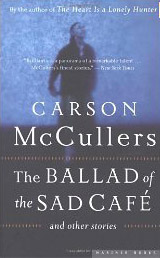 I’m rooting for the hero. I’m hoping to learn some deep truth, even at the cost of emotional pain for the hero and also for myself, because I tend to read with empathy.
I’m rooting for the hero. I’m hoping to learn some deep truth, even at the cost of emotional pain for the hero and also for myself, because I tend to read with empathy.
I reach the final page and I realize the story has ended without any resolution of the sorrow. The ending has no consolation to offer me.
I’ve just finished reading The Ballad of the Sad Cafe, a piece of short fiction by Carson McCullers.
This story deals carefully with the human condition and its propensity to love, and to love dangerously.
A divorced woman who loves a broken hunchback, a criminal who loves this woman, and the hunchback who loves this criminal intermesh into a love triangle.
The protagonist, Miss Amelia, receives love that is not earned, merited, or wanted and also experiences her own outpouring of unconditional, irrevocable and unrequited love for someone who does not return it in kind.
A deep message arises: love needn’t have a logical motive, reason or cause. A lover loves because that is what a lover does, regardless of the acceptance, suitability, or inclination of the beloved. McCullers writes: “The value and quality of any love is determined solely by the lover” and later: “The lover craves any possible relation with the beloved, even if this experience can cause him only pain.”
This brings to mind Ariadne’s love for Theseus, which is fueled by her own bright, unclouded heart and his desperate need for help. We know little of their love, since it was so short-lived, but it is safe to say that Ariadne gave her love without mutual return.
The Ballad of the Sad Cafe draws to its close with a feeling of stranded and abandoned emptiness, similar to Ariadne’s plight when she wakes alone on an island while the man she loves sails away.
What is your reaction to a story that ends sadly? Does you want to immediately throw it aside? Do you pause to contemplate that the lesson may be a tragic one?
Do you write only sad stories? Only happy ones?